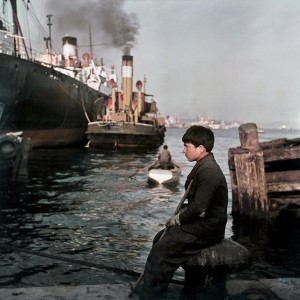Time Ages In a Hurry: Stories
Antonio Tabucchi
(Archipelago Books, 2015)
Over in Italy, Time Ages In a Hurry was one of a spate of Antonio Tabucchi titles preceding his death in early 2012. He wasn’t that old, 68, but he’d long been battling cancer, and in his last year friends and family moved him from Siena, where he taught, to Lisbon, the home of his heart. In the Portuguese capital, Tabucchi could, one last time, share the haunts of poet Fernando Pessoa, his lifelong inspiration. There too, Tabucchi had set the fiction that remains his best-known, actually composed in Portuguese, Pereira Declares (1994). In the mid-’90s this off-kilter look at Spanish Fascism won worldwide esteem, and in Italy there was a movie (Marcello Mastroianni’s last great role). Before and since, to be sure, the author had explored other locales. The novella Indian Nocturne(Italy ’84, US ’89) toured a shape-shifting contemporary India, and my favorite of his story sequences, The Flying Creatures of Fra Angelico (Italy ’87, US 2012—and on Archipelago Books, like Time Ages), time-travels back to the Florence of the Medicis. In short, Tabucchi had a restless sensibility that tried on many imaginative forms; for this, he often drew comparison to the great Italian of the previous generation, Italo Calvino. So as the cancer destroyed him, publishers rounded up whatever they could.
The final titles include for instance an assortment of travel writing, or the Tabucchi equivalent, elliptical reflections on places that mattered to him, Lisbon in particular. One wonders if a catch-all like that will see translation. But Time Ages in a Hurry, originally published in 2009, soon enough asserts itself as a text both coherent and necessary.
The book itself is another beauty of an Archipelago production, its gray cover just faintly blued, faintly rippled, while the title and promotional text are nicely sorted out between its front, back, and deep French flaps. The stories themselves all fall into a similar pace, meditating on whole lives over 15 to 25 pages (one slightly less). While they rove back and forth across the former Iron Curtain, all are distinguished by understatement and indirection, as Tabucchi characteristically takes experience towards dream. Each, however, packs an unexpected blow to the heart, a drama that mushrooms up as dislocated wanderers pore over the wreckage of their 20th Century. Everyone rises to the same desperate if quiet conviction, namely, that they may yet unearth some lost connection, some vestige, providing a stay against the onrush of the years.
Proust comes to mind, in search of lost time, but Tabucchi keeps literary self-consciousness to a minimum. Only the second story, “Drip, Drop, Drippity-Drop,” features a writer, the kind of person who references Proust’s “madeleine” when thinking of his Italian shoes, once fashionable, now broken down. So too, the piece is the only one that has much to do with Italy, but both place and protagonist come across as broken down, indeed rudderless. The writer goes unidentified, though we catch the fond nickname, “Feruccio,” used by his aged, ailing aunt. She provides the skeletal plot, the visits to her hospital bed, a bed she’ll likely never escape. The old woman’s ramblings touch on loved ones lost during the last war, while also raising the question, “do you remember how beautiful Italy used to be?” Her morphine drip provides the title, the soundtrack to the protagonist’s long night in her room, yet when he steps out in the morning the larger loss feels like his own: “How is it possible at his age, with all he’d seen and experienced, that he still didn’t know what the most beautiful thing in the world was?”
My summary emphasizes the downbeat, when Tabucchi has a light touch even with a Nazi massacre. Still, “Drip, Drop” works in a more somber key than most of Time Ages, and so one passage exemplifies the great work of Cooley and Romani, in converting this to English. At one point “Ferrucio,” in a chair beside his aunt, meditates:
How can the night be present? Composed only of itself, it’s absolute, its mere presence is imposing, the same presence a ghost might have that you know is there in front of you but is everywhere, even behind you, and if you seek refuge in a patch of light you become its prisoner.
Material like this could’ve felt leaden, starting with a question (Come può essere presente la notte?) that might seem like the opener in a Socratic dialogue. The subsequent metaphor of the ghost (fantasma che sai che è lì di fronte a te ma è dappertutto) could have bogged down in overexplanation, but Cooley and Romani get the thinking behind the omission of punctuation, or more precisely the lack of thinking: the meandering of a mind at midnight. This couple’s bicultural background —she’s American, he Italian—has resulted in a terrific fluency. I’m sorry they didn’t get the assignment on the next Tabucchi title for Archipelago, a novel due later this year.
And as I say, when it comes to drama, “Drip, Drop” feels wheelchair-bound compared to some of the later pieces. The sequence really hits its stride in stories further from the author’s experience. “The Dead at the Table,” for instance, features a former East German spy, adrift in Berlin after the Wall has come down, and “Between Generals” an Hungarian freedom-fighter, likewise knocked this way and that by the upheavals along the Iron Curtain. The narration moves like a skipping stone over the extremes of such experience, the betrayals and reversals, surprising us each time it touches down on high emotion. Then too, this splendid pair of dramas takes us to opposite poles of Tabucchi’s retrospective imaginings. The spy is forced to conclude “we missed out on the best,” while the soldier lives long enough to enjoy, in the last place he’d expect it, “the best days of [his] life.”
Time Ages intrigues in other ways as well. The number of stories, nine, recalls Salinger, and one of them, “Clouds,” presents a seaside conversation between a pubescent girl and a wounded, unhappy man. Still, that story isn’t the set’s lead-off, and Tabucchi closes it with the assurance that these talks will continue. More importantly, the girl and man see more than glass. They read shapes in the clouds, shapes that matter to them. In other words, readers shouldn’t make too much of the connection to Salinger, no more than of any connection to Calvino. The older author was always less tethered to earth, more about testing the limits of storytelling. Rather Tabucchi, forever returning to the well of saudade—that resonant Portuguese term for nostalgia—might line up most closely with W.G. Sebald, trying to read significance in the rubble of Holocausts large and small. Wherever we place this author, though, Time Ages In a Hurry must rank as one of his signal accomplishments.
http://www.brooklynrail.org/2015/04/books/time-ages-in-a-hurry-stories






